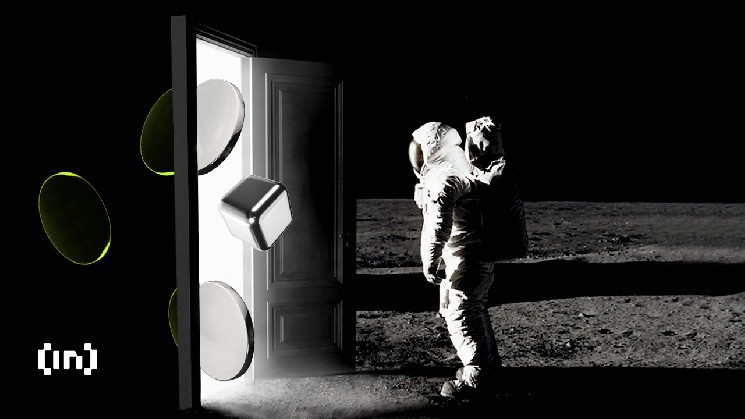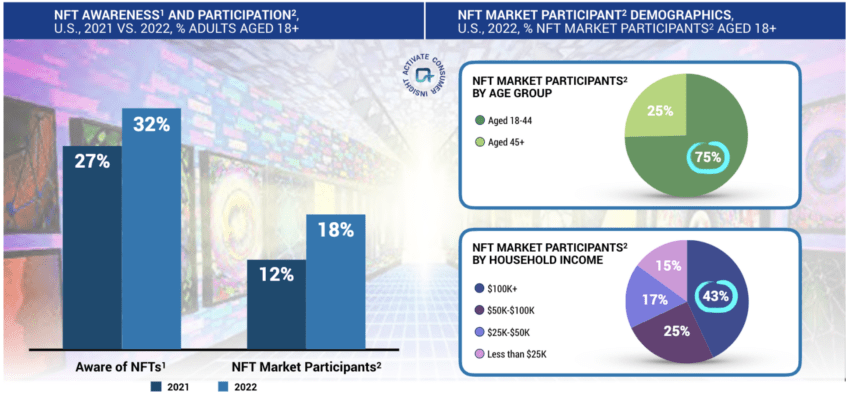Metaverse and NFT Hype Cycle Is Over: What To Expect in 2023?

A new report by Activate Technology reveals that the non-fungible token (NFT) and metaverse hype is over, and that both sectors will need targeted corporate interest going forward.
The future holds new use cases for NFTs to aid companies in building brand loyalty, while the metaverse will need sustained corporate development.
NFT use will change to community-building
According to new report released by the company, NFTs have gone past their peak bubble. Accordingly, the hype surrounding the space will gradually decrease.
NFTs will become mature products, with blockchain and Web3 driving greater utility for the tokens. Companies will also capitalize on the space to build communities around their brands. Buyers will also benefit from a sense of belonging.
Starbucks is already offering the Starbucks Odyssey experience that uses NFT collectible stamps that will give owners access to unique coffee experiences.
Additionally, the report revealed the shift in the demographics of current NFT market participants. It defines participants as those who “researched, discussed, browsed, bid on, purchased, displayed, sold, or created NFTs in the last 12 months.”
The number of U.S. participants increased from 12% in 2021 to 18% in 2022. Still, less than one-third of the U.S. population is still unaware of what NFTs are. Forty-three percent of NFT participants came from affluent households with incomes of $100K or more.

Source: Activate Technology
NFT sales in primary and secondary marketplaces, excluding LooksRare, have exceeded $23B in 2022. Most NFT owners are now buying them for display on social media and collections. This is unlike earlier in the NFT cycle, when people bought and traded NFTs as speculative investments.
Only 51% of adults 18 years or older bought them as investments in 2022, compared to 76% last year. Nineteen percent more buyers are using them for display purposes, while 4% more are treating them simply as digital collectibles.
Twelve percent less are buying them because of novelty. Two percent more are buying them to support an artist or athlete.
Foundation for the Metaverse is set
According to Activate Technology, in addition to the NFT bubble being over, the metaverse hype cycle is also over, with companies needing to identify opportunities and commit business resources to this area. Companies need to now focus on interoperability between virtual worlds to fully leverage the metaverse’s benefits.
The foundation for the metaverse has already been twenty-plus years in the making through immersive virtual worlds in games. Roughly 77% of gamers in the U.S. have taken part in non-gaming activities within games in the last year. They have undertaken avatar creation and personalization and buying virtual goods.
Gamers in China, Japan, and South Korea have collectively spent 30 hours a month playing games like Roblox, Minecraft, and Fortnite that have certain metaverse elements. These elements include an immersive experience, social interactions, mixed reality, identity, and an in-game economy.
Virtual reality and augmented reality will not reach mass adoption and will not be the future of the metaverse.
“We expect to see significant and sustained investment in innovation over the next few years,” the report said in conclusion.






 Bitcoin
Bitcoin  Ethereum
Ethereum  Tether
Tether  USDC
USDC  Dogecoin
Dogecoin  Cardano
Cardano  TRON
TRON  Chainlink
Chainlink  Stellar
Stellar  LEO Token
LEO Token  Hedera
Hedera  Bitcoin Cash
Bitcoin Cash  Litecoin
Litecoin  Monero
Monero  Dai
Dai  OKB
OKB  Gate
Gate  Ethereum Classic
Ethereum Classic  Cronos
Cronos  VeChain
VeChain  Algorand
Algorand  Cosmos Hub
Cosmos Hub  KuCoin
KuCoin  Maker
Maker  Stacks
Stacks  Tether Gold
Tether Gold  IOTA
IOTA  Theta Network
Theta Network  Tezos
Tezos  Zcash
Zcash  TrueUSD
TrueUSD  NEO
NEO  Polygon
Polygon  Dash
Dash  Zilliqa
Zilliqa  Synthetix Network
Synthetix Network  0x Protocol
0x Protocol  Decred
Decred  Qtum
Qtum  Basic Attention
Basic Attention  Siacoin
Siacoin  Holo
Holo  Ravencoin
Ravencoin  NEM
NEM  DigiByte
DigiByte  Enjin Coin
Enjin Coin  Ontology
Ontology  Nano
Nano  Hive
Hive  Waves
Waves  Lisk
Lisk  Status
Status  Steem
Steem  Numeraire
Numeraire  Pax Dollar
Pax Dollar  Huobi
Huobi  BUSD
BUSD  OMG Network
OMG Network  Bitcoin Gold
Bitcoin Gold  Ren
Ren  Augur
Augur  Bitcoin Diamond
Bitcoin Diamond  HUSD
HUSD  Bytom
Bytom